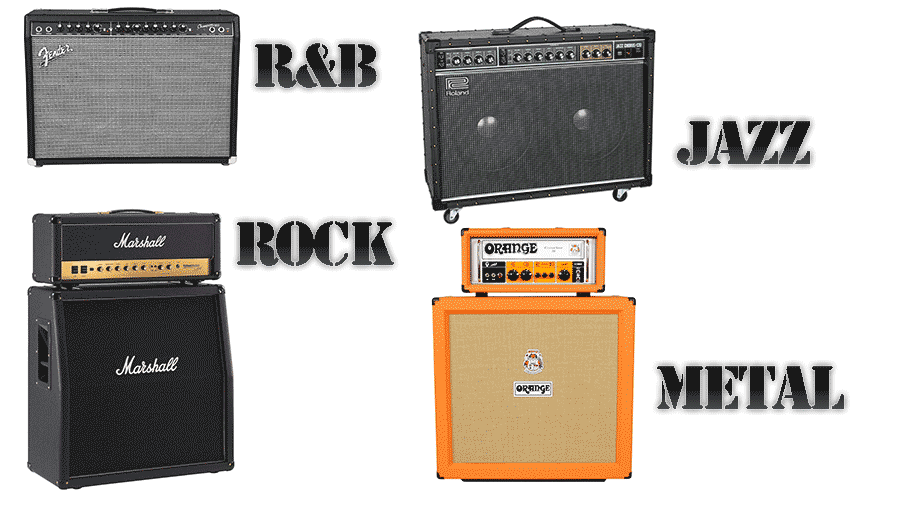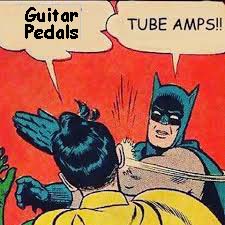Don't buy a guitar amplifier until you read this essential advice
.jpg)
Should you buy your guitar based upon your musical genre?
Is it even helpful these days to say you should select your amplifier for the genre you intend to use it for?
In the shorthand of music store assistant's closing pitch nothing ranks more highly than...
well Eddie Van Halen uses this amp...
The logic behind such a statement is 'well he uses it and he's a top Heavy Metal guitarist', so, 'if you want to shred a top Rock'n'Roll guitarist too you should buy this, like, right now, I want to go on my lunch!'

The truth is that there is so much crossover between modern amps that no amplifier dominates any particular genre any more.
Yes, you can say if you are playing metal you should buy a solid state amp because it will perform longer and hotter but no brand has any monopoly over solid state amps. Manufacturers would love to own a segment of the market but they don't want to limit their market either.
You can make generalisations about preferred amps for music genres but no brand has a monopoly on music type.
|
Jazz |
Clean, combo |
Roland Amplifier jazz chorus, Fender amplifier |
|
Classic rock |
Separates (amp head and stack) |
|
|
Country |
Open back, combo with crunch |
Vox amplifier AC30 |
|
Pop |
Open back, combo with dynamic range |
|
|
Blues |
Open back tube combo/separates |
Marshall, Blackstar |
|
Metal |
Solid state amp and stack |
Orange, Peavy amplifier |
If not genre...what?
I used to work in retail and I can tell you most people couldn't give you a reason for a particular purchase. It seems like a swirling mass of reasons and hunches in their brains. Is it too heavy to cart around? Does it match the color of my guitar? Genre doesn't seem the deciding factor.
What is?
I take a contrarian view. I buy an amp for what it sounds like, not what its hype is.
I can get a decent sound out of any amp over a couple of hundred bucks. It's the laws of physics. A 12" speaker driven by 30 Watts will push air nicely. Likewise, no small and cheapo practice amp is guaranteed a decent sound, though many do.
With any musical equipment that you consider purchasing you need to evaluate it holistically, as part of a complete ecosystem.
I bought my amp and a guitar at the same time. It was a match made in heaven. If you're only buying an amp, you need to take your guitar with you. Yes, you still can't beat the traditional music store.
You choose an amp with your ears not with your wallet
Amplifier Buying Points
What job are you asking your new amp to do? That's more important than genre. Playing small halls? You only need 50W max.
The basic choices are...
- Combo - an amp and speakers combined into one enclosure.
- Separates - an amp 'head' and separate speaker cabinet/s
- Valve-v-electronic (solid state)
The majority of guitarists in all genres favour tube amplifiers for their warm sound. A tube amplifier is a lot louder than an electronic one of the same wattage.
Genre. You will probably get a good clue from other guitarists in your genre as to which brands to begin looking at. You might be surprised at the crossover.
Warning, in common with any products these days you will pay for the name.
Essential guitar amp features include...
- Reverb: This is the 'always on' effect for guitarists
- Effects loop: allows effects pedals between the pre-amp and power section
- XLR out: to your PA, which saves the hassle of miking it up
The clue is in the name - an amplifier has just one job - to make signals louder. You do not need an amplifier that has loads of built-in effects. That job belongs to guitar pedals.
Do I even need an amp?
I know there is a trend for modelling pedals (pedals that emulate amplifiers) to inject them direct through the PA. It's convenient (or lazy) and no self-respecting guitarist should do it! Just look at your guitar hero. Do they have an amp? Of course they do. When you go to see them at a gig you can stand in front and get your ears blasted with all those frequencies and harmonics just the way Joe Bonamassa (or whoever you're watching) wants you to hear it.
Putting a band through a PA means everyone sounds bad. There is no separation, frequencies battle each other, and everything becomes muddy. Playing through a PA only works if you are playing a stadium and have pro sound engineers to mix you through a high-end system. Even then, the engineers will mike up your amp.
Where tone matters most is at the listener’s ear. This is delivered by your amplifier’s speakers pushing air. To keep control of your tone you must keep control of that speaker. Yes, you need an amp.
FRFR
An interesting development recently is the advent of FRFR (Full Range, Flat Response) amplifiers. An FRFR amp emulates the signal it receives as cleanly and accurately as possible. They tend to be cheaper than a boutique amp.
They are ideal for amp modelling pedals, pedals that emulate amps and cabs. However, the theory rarely matches reality. Everything I said earlier about playing through a PA applies equally to FRFR. Let me know if it works from you.
Shopping for a Guitar Amplifier

Get yourself a booth booked up and ask the sales guy to set you up with 3 potential amps of your choice (and a wildcard).
Re the wildcard. Honestly, the sales guy might know what you want better than you. I once went into a store to buy a Gibson Les Paul. I tried several. I was looking for the most bluesy sound. The sales guy put an Ibanez Guitar with Bare Knuckle Aftermath pickups in my hands and that was the one! Wow, an Ibanez is a young buck’s shred machine, but it was also the blues breaker.
Caveat: Watch they don't upsell you - but most store assistants love music just like you!
Listen to the dynamic range. Find the sweet spot. My Blackstar is dual wattage, you can turn it down from 30W to a bearable at 5W for rehearsals.
When you find your guitar amp
When it's right, it's right. You know it.
😍You've fallen in love💝
Buy it. Don't procrastinate. Don't think you can buy it cheaper later, you won't, prices only go one way. You don't just want that make and model, you want THAT amp.
Don't ask me how to get a discount. Whenever the salesperson sees an old guy with grey hair, they know we've got the money to buy the kit, so they usually don't budge!
Conclusion
You need an amp, and it should have character to suit your genre but it will probably suit many others. Your own speakers should be pushing your own air in my opinion. It's the Laws of Physics.
Oh, and don't forget to buy a cover to protect your new asset!
Enjoy your new amp!
NEXT >> how to become a lead guitarist

